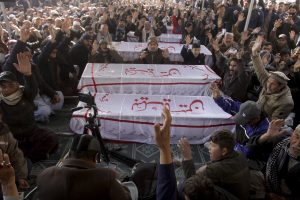By Abdul Sattar

People from the Shiite Hazara community chant slogans beside caskets of coal mine workers who were killed by unknown gunmen near the Machh coal field, during a sit-in protest, in Quetta, Pakistan, Monday, Jan. 4, 2021.Credit: AP Photo/Arshad Butt
Hundreds of Pakistani minority Shiites blocked a key highway January 4 on the outskirts the southwestern Pakistani city of Quetta for a second straight day to protest the killing of 11 coal miners by the Islamic State group.
The miners, members of the country’s minority Shiite Hazara community, were abducted by IS militants in Balochistan province on January 3, taken to a nearby mountain and shot. Six died at the scene and five, critically wounded, died on the way to hospital.
Police video of the bodies revealed the miners were blindfolded and had their hands tied behind their backs before being shot. The attack took place near the Machh coal field, about 48 kilometers (30 miles) east of Quetta, the capital of Balochistan.
The Sunni militant group has repeatedly targeted Pakistan’s minority Shiites in recent years. IS claimed responsibility quickly after the abduction of the miners.
The protesters brought the coffins with the miners’ bodies to the Quetta highway on Monday, insisting they would not be buried until authorities arrest the killers. Under Islamic tradition, burials take place as quickly as possible after death.
The crowd of about 1,000 said it would hold the sit-in until their demands are met. Authorities say they are still trying to trace and arrest the assailants and that police raids were underway in the area.
Officials held talks with Shiite leaders to convince the Hazaras to end the protest as many at the rally, including women and children, wept over the miners’ coffins.
“Whenever terrorists kill our people, the government sends its representatives, saying they will ensure our protection. We never got protection in the past. We want the arrest of the killers of our people,” said Daud Agha, a prominent Shiite leader.
The killing of the miners was largely condemned across the country, with Prime Minister Imran Khan promising the victims’ families would be taken care of and that the perpetrators would face justice.
Pakistan’s Hazara community has been targeted many times in recent years by Sunni militant groups, including the Islamic State group. IS has also declared war on minority Shiites in neighboring Afghanistan, and has claimed a number of deadly attacks across the region since emerging in 2014.
A suicide bombing at an open-air market in Quetta in April 2019 killed 20 people. At the time, IS said it had targeted Shiites and elements of the Pakistani army.
Last January, IS claimed responsibility for a powerful explosion that ripped through a mosque in Quetta during evening prayers. The blast killed a senior police officer and 13 others, and wounded another 20 worshipers.
Pakistan’s Balochistan province has for the past decades also been the scene of a low-level insurgency by separatists demanding more autonomy and a greater share in the region’s natural resources such as gas and oil.
By Abdul Sattar for the Associated Press in Quetta, Pakistan.
No comments:
Post a Comment